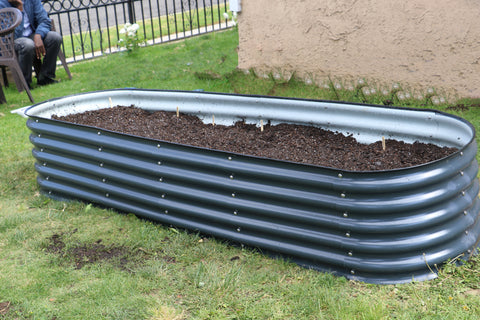Tips from Olle Garden Bed: How to Plant Vegetable Gardens According To Sunlight
Once you find a sunny garden location, you will choose the right plants for the garden according to the amount of sunlight. Most plants will survive in less light than they like, but they will not thrive. If you are satisfied that plants need to grow to maturity forever or never fully mature, you can expand the boundaries with the plants you decide to plant. The following content also has some reference value for raised garden beds.

Let's start from the bottom of the sunlight requirements.
2 to 4 hours of sunlight
This is the kitchen garden plants can survive the minimum sunshine. If you only have two to four hours of sunshine, you will have to keep growing herbs. Many herbs come from Mediterranean region and like sunshine. Nevertheless, they will continue to grow in less than ideal light - they just won't thrive. This means you can still harvest delicious leaves, but not as many as when plants grow in more than 4 hours of sunlight.
You will know that your herbs do not get enough light if they begin to grow long legs (tall and slender) and/or the new leaves appear stunted compared to the old ones.
Herbs that tolerate partial sunlight or shade include mint, chives, lemon balm, dill, parsley, and parsley. The flowering herbs and chives can also grow in some shady places.
4 to 6 hours of sunlight
With only 4 hours of sunshine every day, you can still have a garden full of green leafy vegetables such as lettuce, sesame and spinach. It takes only 4 hours for these plants to produce leaves, but they will reach their full potential in close to 5 or 6 hours. Basically, the longer the sunshine lasts, the more leaves you get and the bigger the plants will grow, but you can still get a lot of salad green harvest from the bed that receives only a few hours of light.
On warm days, many of these plants actually prefer afternoon shade, and you can benefit your garden.
You can try growing carrots, radishes and beets in 5-6 hours of sunlight, but they may take twice as long to grow. You may also let most of the growth take place on the ground, when what you really want to enjoy is the roots under the soil.
If you don't mind being disappointed, just try growing tomatoes, peppers and eggplants.
6-8 hours of sunlight
With so much light, you can easily grow your own root crops, such as carrots, radishes and beets. Don't forget that you can also grow green leafy vegetables and herbs, so it's easy to have a prosperous kitchen garden full of delicious food under so much sunshine.
If your garden receives nearly 8 hours of sunlight, you can also plant bulbs such as onions and garlic.

8 hours or more sunshine
If you have a space with more than eight hours of sunshine, you can plant any plant in the vegetable family, as long as your growing season is suitable.
Lettuce, vanilla and vegetables? yes.
Carrots, beets and radishes? yes.
Tomatoes, peppers and eggplants? exactly.
You can even grow your own potatoes and sweet potatoes, which will absorb every minute of sunlight you give them.
If you have a lot of sunlight and you plant edible plants when they are in season, they will thrive.
No matter how much sunshine, something will grow in your garden
Most importantly, unless you try to build a vegetable garden in a dungeon, cave or basement, the space may grow green things.
Remember the factory? The machine can still work, it just produces something simpler when the power is small.
Your plant is an amazing food machine, eager to grow. They will stretch and stretch, making full use of every bit of sunshine you can give them. At least, you will get many leaves.
If you have never tasted home grown salads, herbs and vegetables, you can enjoy delicious food even if you want to grow tomatoes.
So don't give up your garden just because you don't have enough sunshine. In my book, a garden full of delicious salad plants, herbs and vegetables is almost a garden dream come true.
